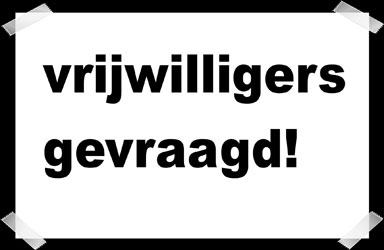 Sten Helmfrid1 en Sture Eriksson2
Sten Helmfrid1 en Sture Eriksson2
1 PhD, Docent fysica, senior wetenschapper, Proximion AB, Kista, lid van de Zweedse ME-Vereniging
2 PhD, Docent aan de Umeå University, geregistreerd arts, interne geneeskunde en geriater, vicevoorzitter van de Zweedse ME-Vereniging
Dit is een vertaling van een artikel dat op 17 februari 2020 in Läkartidningen, Stockholm, Zweden, gepubliceerd werd in enigszins verkorte vorm. http://www.lakartidningen.se/
Citeren?
Helmfrid S, Eriksson S. Vården använder kunskapsluckor som ursäkt för passivitet vid ME/CFS. Lakartidningen. 2020;117:FY3L.
Wanneer myalgische encefalomyelitis/ chronisch vermoeidheidssyndroom (ME/cvs) media-aandacht krijgt, worden het gebrek aan kennis van de onderliggende pathologie en de meningsverschillen binnen de medische gemeenschap vaak benadrukt.(1, 2) Zorgverleners gebruiken de kenniskloof als excuus voor inertie.(3) Het is daarom belangrijk om erop te wijzen dat er eigenlijk veel is waarover de onderzoekers het eens zijn en dat de zorg voor deze verwaarloosde groep patiënten moet verbeteren.
ME/cvs werd voor het eerst waargenomen als vervolg op een bepaalde infectie.(4,5) Het hoofdsymptoom is postexertionele malaise (PEM).(6) Dit kan omschreven worden als aanzienlijke vermoeidheid en verergering van symptomen na lichamelijke of cognitieve activiteit, die vaak vertraagd optreedt. Andere belangrijke symptomen zijn vermoeidheid die niet verlicht wordt door rust, niet-verkwikkende slaap, en neurocognitieve stoornissen (vb. concentratieproblemen, verlies van kortetermijngeheugen, en problemen met het verwerken van informatie). De meeste patiënten vertonen ook een reek van autonome, immuun- en endocriene symptomen, evenals pijn.(7) De ziekte wordt sinds 1969 erkend door de Wereldgezondheidsorganisatie (WHO).(8)
ME/cvs is geen sociaal overdraagbare ziekte, en beperkt zich niet enkel tot westerse samenlevingen. De ziekte wordt op overal gevonden waar er naar gezocht werd: alle sociale groepen, alle etnische minderheden, en alle geografische regio’s. (9-14) Studies tonen aan dat ME/cvs vaak ernstig invaliderend is,(15-19) wat ook erkend is door artsen en wetenschappers die met deze groep van patiënten werken. (20) De ziekte wordt in een alarmerend hoog aantal gevallen chronisch, (21-22) hoewel de prognose voor kinderen en jongeren beter lijkt te zijn. (23,24) In 70 tot 80 procent van de gevallen wordt de ziekte in gang gezet door een infectie. (25-28) Er zijn echter andere uitlokkers, en het begin kan ook geleidelijk zijn. (29) Het is goed gedocumenteerd dat bepaalde ziekteverwekkers een hoog risico hebben op het ontwikkeling van ME/cvs, bijvoorbeeld het Epstein-Barrvirus. (30-34)
Er zijn fysiologische afwijkingen gerapporteerd in een aantal studies, maar er is een verschil van mening over de betekenis van de bevindingen en er is geen duidelijk begrip van de pathologie. Enkele voorbeelden van bevindingen die waardevolle aanwijzingen kunnen geven over wat er gaande is, zijn functionele, chemische en structurele afwijkingen in hersenscans, (35-42), verminderde NK-celcytotoxiciteit, (43) tekenen van autonome (44) en mitochondriale disfunctie (45-47) en een onbekende, oplosbare factor in het bloedserum van patiënten die de resultaten van verschillende studies hebben beïnvloed. (48-52) Fysiologische afwijkingen en verminderde cognitieve prestaties zijn ook waargenomen na inspanning, wat suggereert dat PEM een objectief fenomeen is. (53-58)
De controverse rond ME/cvs gaat vooral over een behandelingsmodel, dat gebaseerd is op de aanname dat de ziekte bestendigd wordt door contraproductieve overtuigingen en deconditionering. Het model is getest in een aantal behandelingsstudies, die matige verbeteringen in subjectieve uitkomsten aantoonden. (59) De resultaten worden echter door veel onderzoekers verworpen, aangezien er geen verbetering in objectieve resultaten werd aangetoond en de behandelingseffecten niet verder gaan dan wat te verwachten valt van systemische bias. (60-63) Een recente review heeft geconcludeerd dat er weinig wetenschappelijke onderbouwing is voor het model. (64)
Er is ook verschil van mening over de diagnostische criteria. Britse psychiaters probeerden ME/cvs te herdefiniëren als idiopathische chronisch vermoeidheid (65), een voorstel dat verworpen is door andere wetenschappers. (66) Deze onzekerheid is echter geen ontkrachting van het fenomeen ME/cvs.
Het is niet acceptabel om patiënten met ME/CVS te verwijzen naar de Zweedse eerstelijnszorg, waar veel huisartsen openlijk de legitimiteit van de diagnose in twijfel trekken. (3, 68) Toegegeven, er is geen specifieke behandeling beschikbaar, maar de patiënten hebben nog steeds een gedegen diagnose nodig, symptoomverlichting en ondersteunende zorg. (69-71) Een recent rapport gepubliceerd door het Zweeds Agentschap voor Gezondheidstechnologische Beoordeling en Beoordeling van Sociale Voorzieningen (SBU) concludeerde dat dit best bereikt kan worden door gespecialiseerde klinieken, (72) die tot nu toe alleen beschikbaar zijn op een beperkt aantal plaatsen. De Zweedse Provincies moeten een grotere verantwoordelijkheid nemen voor deze groep van patiënten en gespecialiseerde zorg verlenen. ME/cvs bestaat en het probleem zal niet verdwijnen.
Referenties
1. Expressen; Sörbring K. Omstridda diagnosen ME ökar snabbt – men splittrar läkarna [tekst in het Zweeds]. 22 februari 2018.
2. Dagens Samhälle; Reimer M. Vården splittrad i synen på hur ME/CFS ska behandlas [tekst in het Zweeds ]. 8 april 2019.
3. Folkbladet; Pettersson A. Neurologen svarar: “Vi ifrågasätter diagnosen” [tekst in het Zweeds ]. 26 januari 2018.
4. Ramsay AM. ‘Epidemic neuromyasthenia’ 1955–1978. Postgrad Med J. 1978;54(637):718-21.
5. Holmes GP, Kaplan JE, Stewart JA, et al. A Cluster of Patients With a Chronic Mononucle-osis-like Syndrome: Is Epstein–Barr Virus the Cause? JAMA. 1987;257(17):2297-302.
6. Committee on the Diagnostic Criteria for Myalgic Encephalomyelitis/Chronic Fatigue Syn-drome; Board on the Health of Select Populations; Institute of Medicine. Beyond myalgic encephalomyelitis/chronic fatigue syndrome: redefining an illness. Washington, DC: Na-tional Academies Press; 2015.
7. Jason LA, Zinn ML, Zinn MA. Myalgic Encephalomyelitis: Symptoms and Biomarkers. Curr Neuropharmacol. 2015;13(5):701-34.
8. Manual of the International Statistical Classification of Disease, Injuries, and Causes of Death. Based on the recommendation of the Eighth Revision Conference, 1965, and adopted by the Nineteenth World Health Assembly. Volume 2: Alphabetical index. Geneva: World Health Organization; 1969. p. 173.
9. Jason LA, Richman JA, Rademaker AW, et al. A Community-Based Study of Chronic Fa-tigue Syndrome. Arch Intern Med. 1999;159(18):2129-37.
10. Reyes M, Nisenbaum R, Hoaglin DC, et al. Prevalence and Incidence of Chronic fatigue Syndrome in Wichita, Kansas. Arch Intern Med. 2003;163(13):1530-6.
11. Nacul LC, Lacerda EM, Pheby D, et al. Prevalence of myalgic encephalomyelitis/chronic fa-tigue syndrome (ME/CFS) in three regions of England: a repeated cross-sectional study in primary care. BMC Med. 2011;9:91.
12. Njoku MG, Jason LA, Torres-Harding SR. The Prevalence of Chronic Fatigue Syndrome in Nigeria. J Health Psychol. 2007;12(3):461-74.
13. Cho HJ, Menezes PR, Hotopf M, et al. Comparative epidemiology of chronic fatigue syn-drome in Brazilian and British primary care: prevalence and recognition. Br J Psychiatry. 2009;194(2):117-22.
14. Kim CH, Shin HC, Won CW. Prevalence of Chronic Fatigue and Chronic Fatigue Syndrome in Korea: Community-Based Primary Care Study. J Korean Med Sci. 2005;20(4):529-34.
15. Nacul LC, Lacerda EM, Campion P, et al. The functional status and well being of people with myalgic encephalomyelitis/chronic fatigue syndrome and their carers. BMC Public Health. 2011;11:402.
16. Falk Hvidberg M, Brinth LS, Olesen AV, et al. The Health-Related Quality of Life for Pa-tients with Myalgic Encephalomyelitis / Chronic Fatigue Syndrome (ME/CFS). PLoS One. 2015;10(7):e0132421.
17. Ohanian D, Brown A, Sunnquist M, et al. Identifying Key Symptoms Differentiating Myal-gic Encephalomyelitis and Chronic Fatigue Syndrome from Multiple Sclerosis. Neurology (ECronicon). 2016;4(2):41-5.
18. Kingdon CC, Bowman EW, Curran H, et al. Functional Status and Well-Being in People with Myalgic Encephalomyelitis/Chronic Fatigue Syndrome Compared with People with Multiple Sclerosis and Healthy Controls. Pharmacoecon Open. 2018;2(4):381-92.
19. Van Heck GL, De Vries J. Quality of Life of Patients with Chronic Fatigue Syndrome. Jour-nal of Chronic Fatigue Syndrome. 2002;10(1):17-35.
20. Centers for Disease Control and Prevention. CDC Newsroom [persbriefing]. 3 nov 2006.
21. Andersen MM, Permin H, Albrecht F. Illness and disability in Danish Chronic Fatigue Syn-drome patients at diagnosis and 5-year follow-up. J Psychosom Res. 2004;56(2):217-29.
22. Cairns R, Hotopf M. A systematic review describing the prognosis of chronic fatigue syn-drome. Occup Med (Lond). 2005;55(1):20-31.
23. Rowe KS. Long Term Follow up of Young People With Chronic Fatigue Syndrome Attend-ing a Pediatric Outpatient Service. Front Pediatr. 2019;7:21.
24. Bell DS, Jordan K, Robinson M. Thirteen-Year Follow-Up of Children and Adolescents With Chronic Fatigue Syndrome. Pediatrics. 2001;107(5):994-8.
25. Wessely S, Powell R. Fatigue syndromes: a comparison of chronic “postviral” fatigue with neuromuscular and affective disorders. J Neurol Neurosurg Psychiatry. 1989;52(8):940-8.
26. Naess H, Sundal E, Myhr KM, et al. Postinfectious and Chronic Fatigue Syndromes: Clini-cal Experience from a Tertiary-referral Centre in Norway. In Vivo. 2010;24(2):185-8.
27. Evans MA, Jason LA. Onset patterns of chronic fatigue syndrome and myalgic encephalo-myelitis. Res Chron Dis. 2018;2(1):1-30.
28. Salit IE. Precipitating factors for the chronic fatigue syndrome. J Psychiatr Res. 1997;31(1):59-65.
29. Carruthers BM, Jain AK, DeMeirleir KM, et al. Myalgic Encephalomyelitis/ Chronic Fa-tigue Syndrome: Clinical Working Case Definition, Diagnostic and Treatment Protocols. Journal of Chronic Fatigue Syndrome. 2003;11(1):7-115.
30. Hickie I, Davenport T, Wakefield D, et al. Post-infective and chronic fatigue syndromes pre-cipitated by viral and non-viral pathogens: prospective cohort study. BMJ. 2006;333(7568):575.
31. De Becker P, McGregor N, De Meirleir K. Possible Triggers and Mode of Onset of Chronic Fatigue Syndrome. Journal of Chronic Fatigue Syndrome. 2002;10(2):3-18.
32. Katz BZ, Shiraishi Y, Mears CJ, et al. Chronic Fatigue Syndrome Following Infectious Mononucleosis in Adolescents: A Prospective Cohort Study. Pediatrics. 2009;124(1):189-93.
33. White PD, Thomas JM, Amess J, et al. Incidence, risk and prognosis of acute and chronic fatigue syndromes and psychiatric disorders after glandular fever. Br J Psychiatry. 1998;173:475-81.
34. Petersen I, Thomas JM, Hamilton WT, et al. Risk and predictors of fatigue after infectious mononucleosis in a large primary-care cohort. QJM. 2006;99(1):49-55.
35. Nakatomi Y, Mizuno K, Ishii A, et al. Neuroinflammation in Patients with Chronic Fatigue Syndrome/Myalgic Encephalomyelitis: An 11C-(R)-PK11195 PET Study. J Nucl Med. 2014;55(6):945-50.
36. Zeineh MM, Kang J, Atlas SW, et al. Right Arcuate Fasciculus Abnormality in Chronic Fa-tigue Syndrome. Radiology. 2015;274(2):517-26.
37. Mueller C, Lin JC, Sheriff S, et al. Evidence of widespread metabolite abnormalities in My-algic encephalomyelitis/chronic fatigue syndrome: assessment with whole-brain magnetic resonance spectroscopy. Brain Imaging Behav. Epub 7 January 2019. doi:10.1007/s11682-018-0029-4.
38. Barnden LR, Crouch B, Kwiatek R, et al. A brain MRI study of chronic fatigue syndrome: evidence of brainstem dysfunction and altered homeostasis. NMR Biomed. 2011;24(10):1302-12.
39. Barnden LR, Crouch B, Kwiatek R, et al. Evidence in chronic fatigue syndrome for severity-dependent upregulation of prefrontal myelination that is independent of anxiety and de-pression. NMR Biomed. 2015;28(3):404-13.
40. Barnden LR, Kwiatek R, Crouch B, et al. Autonomic correlations with MRI are abnormal in the brainstem vasomotor centre in Chronic Fatigue Syndrome. Neuroimage Clin. 2016;11:530-7.
41. Barnden LR, Shan ZY, Staines DR, et al. Hyperintense sensorimotor T1 spin echo MRI is associated with brainstem abnormality in chronic fatigue syndrome. Neuroimage Clin. 2018;20:102-9.
42. Barnden LR, Shan ZY, Staines DR, et al. Intra brainstem connectivity is impaired in chronic fatigue syndrome. NeuroImage Clin. 2019;24:102045.
43. Eaton-Fitch N, du Preez S, Cabanas H, et al. A systematic review of natural killer cells pro-file and cytotoxic function in myalgic encephalomyelitis/chronic fatigue syndrome. Syst Rev. 2019;8(1):279.
44. Newton JL, Okonkwo O, Sutcliffe K, et al. Symptoms of autonomic dysfunction in chronic fatigue syndrome. QJM. 2007;100(8):519-26.
45. Tomas C, Elson JL. The role of mitochondria in ME/CFS: a perspective. Fatigue. Epub 26
February 2019. doi: 10.1080/21641846.2019.1580855.
46. Tomas C, Brown A, Strassheim V, et al. Cellular bioenergetics is impaired in patients with chronic fatigue syndrome. PLoS One. 2017;12(10):e0186802.
47. Tomas C, Brown AE, Newton JL, et al. Mitochondrial complex activity in permeabilised cells of chronic fatigue syndrome patients using two cell types. PeerJ. 2019;7:e6500.
48. Fluge Ø, Mella O, Bruland O, et al. Metabolic profiling indicates impaired pyruvate dehy-drogenase function in myalgic encephalopathy/chronic fatigue syndrome. JCI Insight. 2016;1(21):e89376.
49. Esfandyarpour R, Kashib A, Nemat-Gorgani M, et al. A nanoelectronics-blood-based diag-nostic biomarker for myalgic encephalomyelitis/chronic fatigue syndrome (ME/CFS). Proc Natl Acad Sci U S A. 2019;116(21):10250-7.
50. Morten K. Developments in Understanding the Science Behind ME/CFS. Oral presentation 12 December 2018 at Mt Albert Senior Citizens Hall, Auckland, New Zeeland. https://www.youtube.com/watch?v=WXxR2pQlZWY
51. Prusty B. Pathogenic alterations of mitochondrial dynamics: A working model for ME/CFS. Oral presentation at Accelerating Research on Myalgic Enceplahlomyelitis / Chronic Fa-tigue Syndrome (ME/CFS) Meeting, 4-5 April 2019, Bethesda, Maryland, USA. https://vide-ocast.nih.gov/summary.asp?Live=31640&bhcp=1 [Dr. Prusty’s contribution starts at time index 3:05:36]
52. Davis RW. Progress and Challenges for Myalgic Encephalomyelitis/Chronic Fatigue Syn-drome Diagnostic. Oral presentation 21 November 2019 at Albert Einstein College of Medi-cine, New York, USA. https://www.youtube.com/watch?v=lHY1Q232HsM
53. Nelson MJ, Buckley JD, Thomson RL, et al. Diagnostic sensitivity of 2‑day cardiopulmo-nary exercise testing in Myalgic Encephalomyelitis/Chronic Fatigue Syndrome. J Transl Med. 2019;17(1):80.
54. Light AR, Bateman L, Jo D, et al. Gene expression alterations at baseline and following moderate exercise in patients with Chronic Fatigue Syndrome, and Fibromyalgia Syn-drome. J Intern Med. 2012;271(1):64-81.
55. White AT, Light AR, Hughen RW, et al. Differences in metabolite-detecting, adrenergic, and immune gene expression following moderate exercise in chronic fatigue syndrome, mul-tiple sclerosis and healthy controls. Psychosom Med. 2012;74(1):46-54.
56. Jones DE, Hollingsworth KG, Jakovljevic DG, et al. Loss of capacity to recover from acido-sis on repeat exercise in chronic fatigue syndrome: a case–control study. Eur J Clin Invest. 2012;42(2):186-94.
57. Lien K, Johansen B, Veierød MB, et al. Abnormal blood lactate accumulation during re-peated exercise testing in myalgic encephalomyelitis/chronic fatigue syndrome. Physiol Rep. 2019;7(11):e14138.
58. Cook DB, Light AR, Light KC, et al. Neural consequences of post-exertion malaise in Myal-gic Encephalomyelitis/Chronic Fatigue Syndrome. Brain Behav Immun. 2017;62:87-99.
59. White PD, Goldsmith KA, Johnson AL, et al. Comparison of adaptive pacing therapy, cogni-tive behaviour therapy, graded exercise therapy, and specialist medical care for chronic fa-tigue syndrome (PACE): a randomised trial. Lancet. 2011;377(9768):823-36.
60. Kindlon T. Do graded activity therapies cause harm in chronic fatigue syndrome? J Health Psychol. 2017;22(9):1146-54.
61. Wilshire CE, Kindlon T, Courtney R, et al. Rethinking the treatment of chronic fatigue syn-drome—A reanalysis and evaluation of findings from a recent major trial of graded exercise and CBT. BMC Psychol. 2018;6(1):6.
62. Edwards J. PACE team response shows a disregard for the principles of science. J Health Psychol. 2017;22(9):1155-8.
63. Virology blog; Ablashi DV, Alioto L, Allen M, et al. Trial By Error: Open Letter to The Lan-cet, version 3.0. 13 August 2018.
64. Geraghty K, Jason L, Sunnquist M, et al. The ‘Cognitive Behavioural Model’ of Chronic Fa-tigue Syndrome: Critique of a Flawed Model. Health Psychology Open. 2019;6(1):2055102919838907.
65. Sharpe MC, Archard LC, Banatvala JE, et al. A report – chronic fatigue syndrome: guide-lines for research. J R Soc Med. 1991;84(2):118-21.
66. Green CR, Cowan P, Elk R, et al. National Institutes of Health Pathways to Prevention Workshop: Advancing the Research on Myalgic Encephalomyelitis/Chronic Fatigue Syn-drome. Ann Intern Med. 2015;162(12):860-5.
67. Jason LA, Sunnquist M, Brown A, et al. Examining case definition criteria for chronic fa-tigue syndrome and myalgic encephalomyelitis. Fatigue. 2014;2(1):40-56.
68. Carlbom M, Carlbom D, Alvtegen K, et al. Rätten till liv först! [text in Swedish]. Dagens Samhälle. 8 November 2019.
69. Lapp CW. Initiating Care of a Patient With Myalgic Encephalomyelitis/Chronic Fatigue Syndrome (ME/CFS). Front Pediatr. 2019;6:415.
70. Chronic fatigue syndrome/myalgic encephalomyelitis: A Primer for clinical practitioners. 2014 Edition. Chicago: International Association for Chronic Fatigue Syndrome/Myalgic Encephalomyelitis; 2014.
71. Shepherd S, Chaudhuri A. ME/CFS/PVFS: An Exploration of the Key Clinical Issues. 11th
Edition. Buckingham: The ME Association; 2019.
72. Myalgisk encefalomyelit och kroniskt trötthetssyndrom (ME/CFS). En systematisk översikt. Stockholm: Statens beredning för medicinsk och social utvärdering; 2018. SBU-rapport nr 295 [tekst in het Zweeds].
© Helmfrid & Eriksson. Vertaling Zuiderzon, redactie Abby, ME-gids.
Care providers use the knowledge gap about ME/CFS as an excuse for indolence. PDF Download beschikbaar. Beschikbaar via: https://www.researchgate.net/publication/339325123_Care_providers_use_the_knowledge_gap_about_MECFS_as_an_excuse_for_indolence
Lees ook





